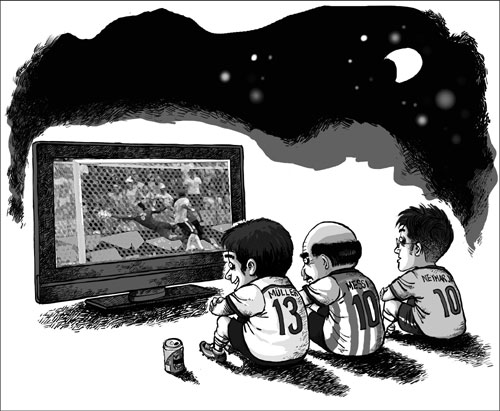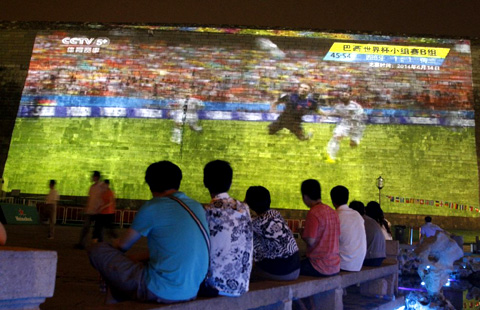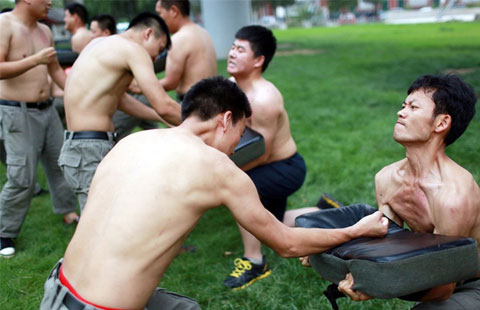World Cup fever sweeps Beijing
Updated: 2014-06-20 07:20
By Bai Ping (China Daily)
|
||||||||
|
Pang Li / China Daily |
 |
| Beauties in World Cup |
 |
| Culture insider: China, birthplace of football |
On Sunday evening, when my family and I arrived for a dinner with my in-laws at a Beijing restaurant, I was surprised to see sitting at the head of the table my wife's father who, proudly wearing a soccer shirt, chatted enthusiastically about the soccer World Cup with my brother-in-law.
I was afraid the old man, who is still recovering from an operation for cancer last year, had been staying up to watch the games like young soccer fanatics. The time difference of 11 hours between Beijing and Brasilia has forced local fans to watch the games at unearthly hours, with the majority of games in the tournament starting between midnight and 6 am Beijing time.
But I didn't ask him because mentioning that I forbid staying up late in my own house, even for the World Cup, was not a particularly cool thing to admit. During the dinner, when I checked WeChat on my cell phone, I saw a colleague had posted a picture of her 7-year-old son slouched on a couch, with the proud proclamation: "My son watching his first World Cup game, he's becoming a man!"
As the tournament takes hold of an army of Chinese fans, arguably the world's largest, each match is watched by millions of Chinese. Only days after the World Cup started, the Internet is already abuzz with reports of many students skipping important tests, husbands ignoring wives and excited enthusiasts dying from diseases exacerbated by watching too many games.
There are many theories about the Chinese love for the World Cup men's soccer. While Chinese fans traditionally tended to root for home teams at international competitions due to national pride, their interests have transcended national borders and ideologies thanks to the globalization of sports and sophisticated media technologies.

 Council of Fashion Designers of America Awards
Council of Fashion Designers of America Awards
 Fan Bingbing, first Chinese actress in Barbie Hall of Fame
Fan Bingbing, first Chinese actress in Barbie Hall of Fame
 Awarding ceremony of 2014 hito Pop Music held in Taipei
Awarding ceremony of 2014 hito Pop Music held in Taipei
 Zhao Liying's photo shoot for Children's Day
Zhao Liying's photo shoot for Children's Day
 'Taken 2' grabs movie box office crown
'Taken 2' grabs movie box office crown
 Rihanna's 'Diamonds' tops UK pop chart
Rihanna's 'Diamonds' tops UK pop chart
 Fans get look at vintage Rolling Stones
Fans get look at vintage Rolling Stones
 Celebrities attend Power of Women event
Celebrities attend Power of Women event
Most Viewed
Editor's Picks

|

|

|

|

|

|
Today's Top News
Greek PM salutes 'a game changer'
Hainan expands US presence to Boston
US to send 300 military advisers to Iraq
Evacuation plans made for Chinese workers in Iraq
Evacuation plans made for Chinese workers in Iraq
US citizens arrested on terror charges
Bomb plot defendant denied files by court
Rare stamp sets record at New York auction
US Weekly

|

|








